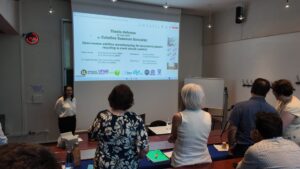
-
On Tuesday, June 24, 2025, Catalina Suescun will defend her doctoral thesis in ENSGSI’s Amphitheatre 2. The thesis is entitled:
“Open-source additive manufacturing for bi-material plastic recycling in short circuit context”
The global production of plastic has grown exponentially, resulting in a persistent accumulation of plastic waste in the environment, an estimated 79% of which ends up in landfills or natural ecosystems. This alarming trend highlights the urgent need for sustainable and localized waste management solutions.
In response, the past decade has seen additive manufacturing (AM) emerge as a promising avenue, particularly through its potential to enable distributed plastic recycling. By repurposing post-consumer plastic waste as feedstock for 3D printing, AM opens new possibilities for circular, low-carbon production systems. Among AM technologies, Material Extrusion (MEX), notably Fused Filament Fabrication (FFF), has gained traction as a decentralized manufacturing method. More recently, large-format Fused Granular Fabrication (FGF) has further expanded these capabilities by enabling direct printing from recycled plastic flakes or pellets, reducing both material costs and processing steps. This combined approach is referred to as Distributed Recycling and Additive Manufacturing (DRAM).
However, a key limitation of plastic recyclability lies in the incompatibility between different types of polymers. When immiscible plastics are blended without proper compatibilization, the resulting material often suffers from poor mechanical properties and processing challenges.
This thesis investigates the development of a sustainable, open-source-based recycling process for bi-material plastics, specifically focusing on the immiscible combination of recycled polyethylene terephthalate (PET) and high-density polyethylene (HDPE), from plastic water bottles. By assessing the feasibility of direct 3D printing using these materials with compatibilizers such as SEBS, the study aims to bypass the costly and time-consuming sorting phase.
Supported by multidisciplinary collaboration between the ERPI (Équipe de Recherche en Processus Innovatifs), the LRGP (Laboratoire Réactions et Génie des Procédés), and the FAST (Free Appropriate Sustainability Technology) group, this research explores DRAM from a global perspective, assessing material behavior, and open-source technological development.
This thesis was carried out as part of a doctoral contract co-directed by Hakim Boudaoud (UL, ERPI), Cécile Nouvel (UL, LRGP) and co-supervised by Joshua M. Pearce (Western University, Canada).